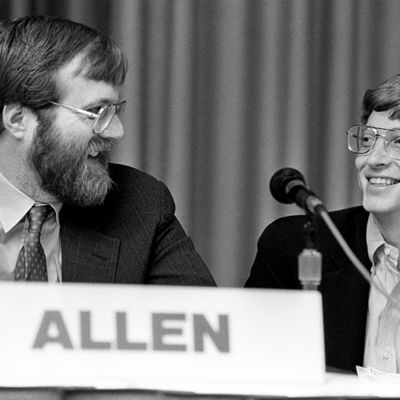
If Bill Gates is known for founding Microsoft and building it into one of the world’s most powerful companies, Paul Allen might be best known for founding Microsoft — and then, in 1983, walking away. Allen, who died this week at age 65, spent the remainder of his life pursuing his passions in oceanography, aviation, philanthropy, music, art, and supporting the Pacific Northwest — including buying the Seattle Seahawks and Portland Trail Blazers to ensure they didn’t move to sunnier climes — but it was a series of decisions he made early on at Microsoft that set the company on its path to world-transforming success.
Micro-Soft was founded in 1975 (it dropped the hyphen a year later) after Allen convinced his high-school friend Bill Gates to join him in dropping out of college to develop software for a new type of computer known then as “microcomputers” — what we’d called a desktop computer today. Microcomputers were meant for the home hobbyist and were radically smaller than the massive mainframes meant for large businesses that had defined computing until then. Their first success came in building a pared-down version of the BASIC programming language that could run on the smaller machines.
Allen was the more creative programmer, while Gates had a sharper business acumen. But it was Allen who made one of the key business decisions that turned Microsoft from a small player in the world of software to one of the world’s largest companies. In 1980, IBM hired Microsoft to write an operating system for its IBM Personal Computer. Allen and Gates secured the deal without actually having an operating system ready for IBM. They bought an operating system, QDOS (or Quick and Dirty Operating System) from another programmer for $100,000, and spent a year turning it into something that could run on the IBM PC, calling it MS-DOS, or Microsoft Disk Operating System.
Crucially, Allen made the decision to sell MS-DOS to IBM, but relinquish any royalties from IBM in exchange for the right to license MS-DOS to any and all competitors as well. When the IBM PC became a runaway success, a series of IBM clones quickly hit the market, and Microsoft was able to sell MS-DOS to all of them as well. MS-DOS became an industry standard.
Behind the scenes, friction between Gates and Allen grew, especially over compensation — Gates secured 64 percent of the company for himself, while Allen had only 36 percent. Gates had also brought in his Harvard classmate Steve Ballmer to help run the business side of Microsoft, and Allen saw Gates and Ballmer as aligning against him.
In 1982, he started getting odd aches and night sweats, and eventually was diagnosed with Hodgkin’s lymphoma in 1982, at the age of 30. While he was able work with doctors to beat the disease, it caused him to decide to leave Microsoft.
“If I were to relapse, it would be pointless — if not hazardous — to return to the stresses at Microsoft,” he wrote in his 2011 autobiography Idea Man. “If I continued to recover, I now understood that life was too short to spend it unhappily.”
So Allen left Microsoft in 1983, but retained his stake in the company. When Microsoft went public in 1986, he became a billionaire. His interests were wide and varied, ranging from deep-sea exploration on his research vessel and megayacht the Octopus, to attempting to save the African elephant. He also donated over $2 billion to various philanthropic pursuits, including the Allen Institute for Brain Science and the Allen Institute for Artificial Intelligence.
He was also a talented and passionate amateur musician. In an interview with New York, Quincy Jones singled out Allen for his skill on guitar. “You know who sings and plays just like [Jimi] Hendrix?” Jones said. “Paul Allen.”
He passed away from complications due to non-Hodgkin’s lymphoma on Monday. In a statement, Gates said he was “heartbroken by the passing of one of my oldest and dearest friends.” Gates continued: “He channeled his intellect and compassion into a second act focused on improving people’s lives and strengthening communities in Seattle and around the world. He was fond of saying, ‘If it has the potential to do good, then we should do it.’ That’s the kind of person he was.”





























